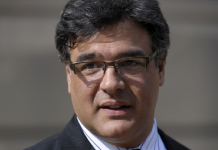- Malika, a 20-year-old University student, votes in Uzbekistan’s parliamentary election.
- Malika emphasizes the importance of informed voting for the future of Uzbekistan.
- Polling stations opened on October 27 for the Legislative Chamber and local councils.
- Five parties are participating in the elections, including the Uzbekistan Liberal Democratic Party and the Democratic Party “Milliy Tiklanish.”
- The elections are conducted under a mixed electoral system, combining majoritarian and proportional representation.
- The election process is fully digitalized through the “E-Saylov” information system, with over 850 international observers monitoring.
TASHKENT, Uzbekistan, October 27: Malika, a 20-year-old University student of Uzbekistan, cast her vote in the parliamentary election 3rd time at a local polling station. “As a representative of the young population of Uzbekistan and a third-time voter, I prepared for the elections from the very beginning. I read about the plans of each party and what they want to implement,” she said.
According to her, the parliamentary election is crucial for the future of the entire population, and therefore, one must vote consciously for candidates. “It is an honor for me to vote in the parliamentary elections because the results will affect the lives of the people of Uzbekistan,” she added.
Polling stations opened in Uzbekistan on October 27 for the election to the Legislative Chamber of the Oliy Majlis (parliament) and local kengashes (councils) of people’s deputies. Polling stations are open from 8:00 AM to 8:00 PM (GMT+5), with preliminary results expected on October 28. Five parties are participating in the elections: the Movement of Entrepreneurs and Businessmen – Uzbekistan Liberal Democratic Party, Democratic Party “Milliy Tiklanish,” Ecological Party, People’s Democratic Party, and Social Democratic Party “Adolat.”
This year’s elections are being held according to a mixed electoral system in line with the updated Constitution and national electoral legislation. This system provides for 75 members of the Legislative Chamber to be elected in single-mandate constituencies using the majoritarian electoral system, while the remaining 75 members will be elected using the proportional representation electoral system with party lists. Another notable aspect of this year’s elections is the full digitalization of the process through the “E-Saylov” information system. Over 850 foreign and international observers, including missions from the Commonwealth of Independent States (CIS), the Shanghai Cooperation Organization (SCO), and the Organization of Turkic States (OTS), are monitoring the election process.






